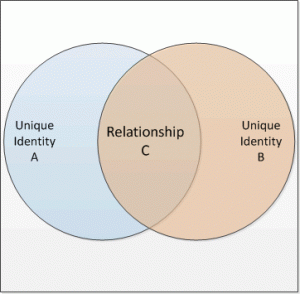When two persons enter into a relationship (be it professional or personal), the following interaction happens.

This creates three distinct areas - the two persons having unique identities A, B and a third shared identity (C).
This is a very important concept – that the relationship is separate from the persons who create the relationship. Just like we invest in ourselves, we have to invest in the relationship also. A relationship is like a child born out of two persons coming together, and the child has a unique and distinct personality from the two parents. The way parents feed the child (emotionally and spiritually) determines how the child grows.
Characteristics of
- We invest time in a relationship. Since time is a constraint, the amount of time spend eats into personal time and this creates issues. The time can be willingly given, or forcibly taken. The time spent is at the expense of other activities and these have repercussions. The fact that time is being spent implies that it be utilized well. If I perceive that the other person is physically present, but not fully there, I can feel the time to be wasted.
- We also invest emotional content in a relationship. We create memories of good and bad times, we fight, make up and we spend quality time together. Each incident has an emotional content that either nurtures or destroys the relationship.
- We have multiple relationships at the same time. We have a professional relationship at work, a semi-professional one with colleagues, a separate type of relationship with friends, with parents and with our spouse. Since time is a constraint, there is a continuous tussle in prioritization.
- Each relationship has a purpose and fulfills some need. If there is no need or the need is not being fulfilled, the relationship dies. Sometimes because of social pressure, we continue in a relationship for the sake of appearances. This happens professionally as well as personally.
- A relationship is of a finite duration. It may extend to the lifetime of one person, or for a smaller duration. Sometimes, one person leaves the relationship, due to death or change of priorities. Other times, needs change or are satisfied and there is no need for the relationship. Eventually when the relationship does, we suffer a sense of loss. We retain the emotional content and remember the good times. All loss leads to a feeling of grief and we go through 5 stages of grief.
- The nature and the boundaries of a relationship changes. We sometime, specially when in love, put all other relationships at low priority and invest everything in one relationship. This happens especially if we believe that this relationship will fulfill all our needs. We sometimes start changing the relationship and want more out of a relationship what the other person wants to give. We start ignoring boundaries. We start taking the relationship for granted. We force things.
How to maintain a relationship
- Understand the finite nature and the changing nature of a relationship. A negative person may therefore conclude that there is no use of a relationship. A positive person would rather enjoy the relationship and the experience while it lasts. We also need to understand that the initial boundaries and the time spent on a relationship will change. We should be prepared for it, and deal with it.
- A smart investment manager creates a portfolio of low-yield stocks that have guaranteed returns as well as instruments giving high-returns but having risk. He actively looks at the value of the portfolio and juggles his investments to match his objectives. He spreads his risk and monitors daily. A bad manager will have a large dependency on one stock, and may not actively monitor, taking his portfolio for granted. Similarly, we need to understand that different needs are satisfied by different relationships and depending on one relationship to satisfy all needs can create serious damage
- A relationship is not the person. We may respect the person, and we need to respect ourselves, and not blame the success or failure of the relationship on the persons creating the relationship. A relationship has a life of its own, different from the life of the persons involved. You cannot, individually, take the blame not the credit for the relationship.
No comments:
Post a Comment